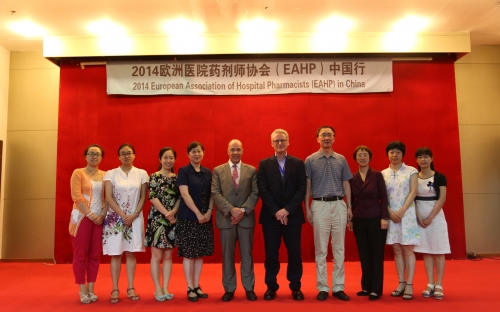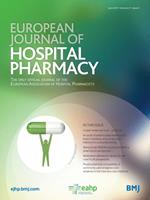EAHP EU Monitor - 12 August 2014
 The EAHP EU Monitor is a regular round up of news relevant to hospital pharmacy in Europe.
The EAHP EU Monitor is a regular round up of news relevant to hospital pharmacy in Europe.You can subscribe to receive the EAHP EU Monitor by email here.
From Brussels to Beijing: EAHP China tour grows important relationship
The European Association of Hospital Pharmacists (EAHP) has recently completed a tour of China to promote practice developments in European hospital pharmacy and develop its relations with organisations in China.
EAHP President Dr Roberto Frontini, Professor Anthony Sinclair of the EAHP Scientific Committee, and Professor Phil Wiffen, Editor-in-Chief of the European Journal of Hospital Pharmacy (EJHP) spent 6 days in July visiting hospitals across China, including Beijing and Shanghai. As well as sharing experiences in practice development from Europe, the EAHP trio also had an opportunity to learn from China’s experience in meeting the needs of patient care and patient safety in the hospital environment.
More information here.
 New debate starts on access to Eudravigilance information
New debate starts on access to Eudravigilance information
The European Medicines Agency (EMA) has opened a consultation on its proposed policy for permitting access to information held in its Eudravigilance database, and in so doing has started a fresh debate about suggested ‘censorship’ by the Agency.
The Eudravigilance database is of much interest to many scientists and researchers in the field of medicine as it holds all suspected adverse drug reaction (ADR) reports on medicines in Europe. However, transparency campaigners are concerned that the EMA’s proposed policy, that any publication that uses Eudravigilance data should be shown to the EMA before publication, amounts to a form of censorship. The EMA may then raise with authors what it believes to be “incorrect analyses, unsupported inferences, misleading statements” or personal data concerns. It will expect authors to address these before publication.
Further to this, an EMA panel will review individual research requests for access to the database and may refuse permission if they are unconvinced that proposed research has a public health value or is conflict with EMA public health and legal responsibilities.
Reasoning for the proposals includes the need to avoid scaremongering around the safety of drugs or misrepresentation of data. An EMA spokesperson said: “Publications can have major impact on use of medicines and public health and it is in everyone’s interest that they are done with a clear understanding of the data.”
However Ben Goldacre, co-founder of the AllTrials campaign, described the proposals as “state censorship of scientific discussion and data analysis of public health data” and felt EMA could be in a position of conflicted interest if researchers highlight problems in EMA decisions. Others have highlighted the bureaucracy and cost involved in the proposals.
The consultation closes on 15 September 2014.
Consultation here.
PJ Online summary of the debate and viewpoints here.
Phar-In consortium seek hospital pharmacist input to future biotechnology education needs

A consortium initiative called ‘Phar-In’, financially supported by the European Commission and led in part by the European Industrial Pharmacists Group (EIPG), is currently investigating the needs and scope of pharmacist (and other health professional) education in the area of biotechnology, including for hospital pharmacists.
As part of this investigation a survey of practising professionals is being conducted, the results of which will be used to formulate the competencies and programmes of pan-European education programmes in biotechnology, including a distance learning Masters.
https://www.surveymonkey.com/s/pharin4
Replies are requested by 15th September.
EAHP encourages hospital pharmacists to respond to the survey in order to ensure wide input from hospital pharmacy to this project and its outcomes.
EJHP: Influence of equation used to estimate the renal function in dosage potentially nephrotoxic drug
A recent original research article published in EJHP online considers the similarity (or not) of the dose recommendations according to the Cockcroft–Gault and MDRD4 (modified diet in renal disease) equations.
The study, conducted in Spain, made use of a cross-sectional comparative observational test of patients suffering chronic renal illness that involved treatment using nephrotoxic drugs, admitted consecutively to the internal medicine department over a period of 6 months. The results of the study provide considerations as to which formula is best for evaluating the renal function of patients with CKD
Article here.






